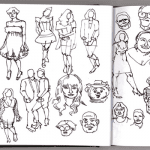To Deka’s credit it can be said that he stopped in the purlieu of the poetic ideal of the sixties. Of course, it does not mean that all his early poems are free from the affectation of pure poetry, rather quite a few of his early poems, seem to be a mere exercise of perfection. But he will be remembered as the poet of a number of exquisite, matchless lyrics in our language that he authored during this period. But for these beautiful lyrics his position in the triumvirate of the Assamese poetry in the sixties, (the other two being Nilmani Phookan and Bhaben Barua) would have been the same as Arnold’s in the triumvirate in the Victorian English poetry. Among these beautiful poems Deka composed in the sixties, the most outstanding is ‘Samudra Bhiti’ (Sea-Scare). This poem, in its Iyricism and profundity, not only excelled all other poems of this period, but also set him apart from his contemporaries and established him as a figure of consequence on the literary scene of Assam. It is worthwhile to take note of what the poet says on it compostion. “l was my young when I wrote that poem (Sea-Scare). I was quite hesitant to publish the poem as I did not see a sea till then except in films.”’ Interestingly, Rimbaud also did not see the sea when he wrote “Bateau ivre’ ’ at the age of seventeen only. Rimbaud’s description of the sea is, therefore, partly the work of his imagination and partly the result of his reading. Deka’s vision of the sea is partly from his listening to “my lather reading out ‘Mahabharata’ to my mother” when he was a child. Our people living in a land-locked region of North-East India always have a great fascination for the sea as the undiscovered fluid universe, which a man leaves for after his death. The fascination for the sea, therefore, is not a new thing to Assamese poetry. This fascination for the sea occupied some of the great poetic minds of Assam through the ages. Madhava Kandali, a great poet of the fourteenth century, reputed as the first poet to translate Ramayana into a provincial language of Northern India, expressed the same sense of wonder and fear that Deka has expressed in his poem, at the sight of the sea.
‘After that the primates raised their heads to look around,
Spread into their vision, the sea wide and profound.
The waves countless rose mountain high,
Mingled into one the sea and the sky.”
(Ramayana, Canto 4, XXIV, 1-2)
Though Rimbaud’s ‘Bateau ivre’ has been mentioned in the context of Deka’s poem, ‘Sea-Scare’, there is nothing common between the two poems. In Rimbaud’s poem the sea is simultaneously the real sea and a cosmic sea, in Deka’s poem the sea is a cosmic sea. Moreover, the sea is just an entity in Deka’s poem, it is not the theme. The theme is the poet’s meditation over the transience of his creative efforts in the ocean of time.
“Time moves unconcerned
Past, present and future roll into one time
And you all just dance round it.
Shadowy strains and forms.
I’d fain know them but cannot
And then suddenly I am scared
Whoever would know me and my myriad progeny.”
Though much of the subtle, wary music of the poem in the original language is lost in the translation its “tremuIous cadence” can be felt even in the translation. The poet’s acrimonious conviction of the transience of his poetic creations does not deter him from aspiring or searching for the permanence for them.
““Yet the conch will blow to tend the air
Even though I know dark will be on us suddenly
And, gradually all music will cease
the rise and toll would end”
The mood and tone of the poem may remind one of Baudelaire’s “Le Voyage” though the duality of hell and heaven, guilt and innocence as expressed in Baudelaire’s poem, does not exist for our adolescent poet. The ambitious reader may even look for a similarity between Baudelaire’s poem and the concluding lines of Deka’s “Sea-Scare”
“Pour us your poison to comfort us!
This fire burns our minds that
we want to plunge to the
bottom of the abyss, hell or
heaven, what does it matter?
To the bottom of the unknown
to find something new!”
(C.A. Hackett’s prose translation of ‘Le Voyage)*
“but I see the sea herself is unconcerned
forever expectant
my heart too is full of the sap
of creation and consciousness
yet I am scared of the sea
and of the mysteries in her ancient bosom}’
(Sea-Scare)
In spite of Deka’s exalted position in the lyrical poetry of the sixties, with the advent of the next decade he began to lose his love for symbolism and lyrical image. The two distinguishing elements of his earlier poetry, surprise and invention, have disappeared from the poems he wrote in the seventies. But, though he has not become a professional innovator in the mould of some of his contemporaries, he refuses to treat poetry as a means to an end. It may be remembered that as a young officer Deka spent a few years in violence-torn Mizoram and there he witnessed the tragedies of man’s inhumanity to man. Those experiences acted as a catalyst to the change in his aesthetics and his attitude to life and they, perhaps, hastened his estrangement from the poetic ideal of the sixties. The sign of this change was first noticed in a handful of poems he wrote on his Mizoram experiences. But in these poems he has used the same poetic tools forged to describe nature in his earlier poetry, to redefine human longing. The result is a singular understatement of human brutalities and human sufferings. How coolly, at the same time how firmly, a fearful tragic human situation is described and analysed in the poem like “A poem from Lunglei” and Posterity”:
“Through clouds scurrying atop the hill
Come resounding footfalls of thumping boots
Who are they marching there?
……………………………………………………….
At the creaking of rusty hinges –
Their looms before my eyes
The blood—soaked streets of my familiar town.”
(A poem from Lunglei)
“Their heels scatter a dust of red ants
All at once I hear huzzas of victory
Across the open skies.
The bullets fly in glee like birds.”
(Posterity)
In this kind of protective detachment, as noticed in these poems, there is so much compassion for the suffering of mankind that the understatement, instead of impoverishing the effect, is ultimately more stirring and more eloquent than any direct reference to corpses, blood, death and terror. In these poems, inspired by the Mizoram experience, the sense of fraternity he felt towards the rebels cannot go unnoticed but it is the poet’s sense of isolation that determines the mood of the poems.
In his later poems, written since the mid—seventies Deka has evolved a new idiom and a new style of his own, which is distinctively straight forward and narrative. In these poems reflection and explication have taken the place of lyricism of his earlier poetry. The language, the poet uses in them, is characterised by the fluidity of speech. But he resents the employment of the language of the street just to create an ‘anti-poetic’ effect which the Russian Futurists did. In the matter of form and subject matter of his later poetry Deka is very close to the Russian Acmeists like Anna Akhmatova and Osip Mandalstram who did not accept the division of the world into “ugly prose’ ’ and “sublime poetry” — any experience or perception could come within the poet’s sphere. Even the social concem, reflected in his poems resembles the Acmeists’ concern for social betterment. The Acmeists believed that to abandon the heritage of the past for the sake of ‘progress’ would be like denying ‘ ‘the sacred succession of interlinked events”. “In A Day Under Curfew’ ’, a poem embodying the idea of socialist optimism the old woman stands for the *** of history
“Again we see a blue canopy covering the sky
The lively glitter of fresh leaves on treetops
Tow more tender young peepal leaves in the heartless rock
Above the houses the embracing of soothing winds.”
(A Day Under Curfew)
Deka has borrowed the language of poetry from the west, but it has turned, in his poetry, a life and flavour of the land where the poet was born and is dying. That explains why a literal translation of lines from his poems, sometimes fails to ring in English. This happens as the idiom, he has evolved in the long forty years of his poetic asceticism, does not always sit easily in English. It is the original language in which the poetry comes to the poet, which ultimately determines our judgement of his poetry. Only three volumes of Deka’s poems have been published till now, but, as Octavio Paz says, “the greatness of a poet is not measured by the extent but by the intensity and perfection of his works”. Indeed, it is by the intensity and perfection of his works that Deka has moved into the twenty—first century so effortlessly as one of the best poets of the twentieth century in our language.
Notes :
*” In Deka’s poem the self like Gregor Samsa in Kafka’s “The Metamorphosis’ would like to return to its old life, but is prevented from doing so by the incomprehensible force of his camouflage-existence.
‘But time and again it lets out a shriek
fearing that your healthy hands
May cure on invisible affliction called ‘I’ in its brain
Who among you understand it?”
In these lines I hear an echo of Kafka’s “The Metamorphosis” ‘He recalled his family to memory with deep emotion and love. His conviction about the necessity of his disappearing was, if anything, more resolute than that of his sister. In this state of blank and peaceful meditation he remained until the tower clock struck the third hour of the morning, He lived to see daybreak brightening everywhere outside his window’
** Dr. Gohain, who made use of some New Criticism devices skilfully and successfully in his critical analyses of some important literary works, held the view even then, perhaps under Leavis’s greater influence on him, that the poetic image would be a symbol or vehicle of truth only because of the organic or effective presence of intellect or rational discourse in it.
***Critique of the poetic ‘Image’
****Verse-nous ton poison pour qu’il nous re’conforte!
Nous voulons, tant ce feu nous brule le cerveau
l’longer au fond du gouffre, Enfer ou Ciel, qu’importe?
vu fond del l’Inconnu pour trouver du nouveau
Prabhat Bora writes on Indian Review.




Leave a Reply